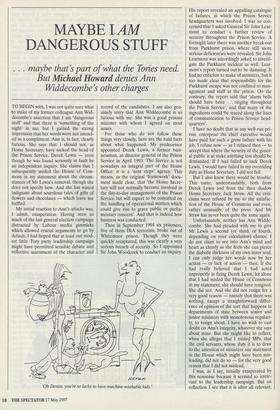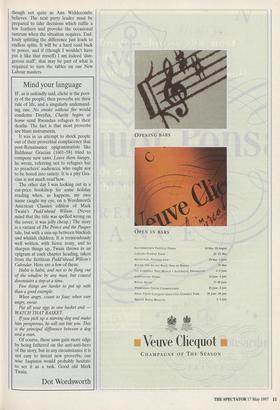MAYBE I AM DANGEROUS STUFF
. . . maybe that's part of what the Tories need.
But Michael Howard denies Ann
Widdecombe's other charges
TO BEGIN with, I was not quite sure what 'to make of my former colleague Ann Wid- decombe's assertion that I am 'dangerous stuff' and that there is 'something of the night' in me, but I gained the strong impression that her words were not intend- ed as a compliment. Ann is, in fact, clearly furious. She says that I should not, as Home Secretary, have sacked the head of the Prison Service, Derek Lewis — even though he was found seriously at fault by an independent inquiry. She claims that I subsequently misled the House of Com- mons in my statement about the circum- stances of Mr Lewis's removal, though she does not specify how. And she has waxed indignant about scurrilous tales of gifts of flowers and chocolates — which leave me baffled.
My initial reaction to Ann's attacks was, I admit, exasperation. Having seen so much of the last general election campaign distracted by Labour media gimmicks which allowed crucial arguments to go by default, I had hoped that at least our mod- est little Tory party leadership campaign might have permitted sensible debate and reflective assessment of the character and record of the candidates. I am also gen- uinely sorry that Ann Widdecombe is so furious with me. She was a good prisons minister with whom I agreed on most issues.
For those who do not follow these things very closely, here are the bald facts about what happened. My predecessor appointed Derek Lewis, a former busi- nessman, as director general of the Prison Service in April 1993. The Service is not nowadays an integral part of the Home Office: it is a 'next steps' agency. This means, as the original 'framework' docu- ment made clear, that 'the Home Secre- tary will not normally become involved in the day-to-day management of the Prison Service but will expect to be consulted on the handling of operational matters which could give rise to grave public or parlia- mentary concern'. And that is indeed how business was conducted.
Then in September 1994 six prisoners, five of them IRA terrorists, broke out of Whitemoor prison. Though they were quickly recaptured, this was clearly a very serious breach of security. So I appointed Sir John Woodcock to conduct an inquiry.
`Oh Denise, you're so lucky to have machine-washable kids.' His report revealed an appalling catalogue of failures, in which the Prison Service headquarters was involved. I was so con- cerned that I asked General Sir John Lear- mont to conduct a further review of security throughout the Prison Service. A fortnight later there was another break-out from Parkhurst prison, where still more serious deficiencies were revealed. Sir John Learmont was accordingly asked to investi- gate the Parkhurst incident as well. Lear- mont's report turned out to be damning. It had no criticism to make of ministers, but it too made clear that responsibility for the Parkhurst escape was not confined to man- agement and staff at the prison. On the contrary, the report said that 'alarm bells should have been . . . ringing throughout the Prison Service', and that many of the ingredients could 'be traced along the lines of communication to Prison Service head- quarters'.
I have no doubt that in any well-run pri- vate enterprise the chief executive would have paid for such a gross failure with his job. I refuse now — as I refused then — to accept that where the security of the gener- al public is at stake anything less should be demanded. If I had failed to sack Derek Lewis, I would have failed in my overriding duty as Home Secretary. I did not fail.
But I also knew there would be trouble. This came, understandably, both from Derek Lewis and from the then shadow Home Secretary, Jack Straw. All the criti- cisms were refuted by me to the satisfac- tion of the House of Commons and even, rather unusually, of the press. And Mr Straw has never been quite the same again.
Unfortunately, neither has Ann Widde- combe. She had pleaded with me to give Mr Lewis a second (or third, or fourth, depending on your calculation) chance. I do not claim to see into Ann's mind and heart as clearly as she feels she can pierce the diabolic darkness of my own inner soul. I can only judge her words now by her action — or lack of action — then. If she had really believed that I had acted improperly in firing Derek Lewis, let alone that I had misled the House of Commons in my statement, she should have resigned. She did not. And she did not resign for a very good reason — namely that there was nothing, except a straightforward differ- ence of opinion of the sort that happens in departments of state between senior and junior ministers with monotonous regulari- ty, to resign about. I have no wish to cast doubt on Ann's integrity, whatever she says about mine. But she might like to reflect, when she alleges that I misled MPs, that the civil servants, whose duty it is to draw to the attention of ministers any statement in the House which might have been mis- leading, did not do so — for the very good reason that I did not mislead.
I was, as I say, initially exasperated by this nonsense because it seemed so irrele- vant to the leadership campaign. But on reflection I see that it is after all relevant, though not quite as Ann Widdecombe believes. The next party leader must be prepared to take decisions which ruffle a few feathers and provoke the occasional tantrum when the situation requires. End- lessly splitting the difference just leads to endless splits. It will be a hard road back to power, and if (though I wouldn't have put it like that myself) I am indeed 'dan- gerous stuff, that may be part of what is required to turn the tables on our New Labour masters.



































































 Previous page
Previous page